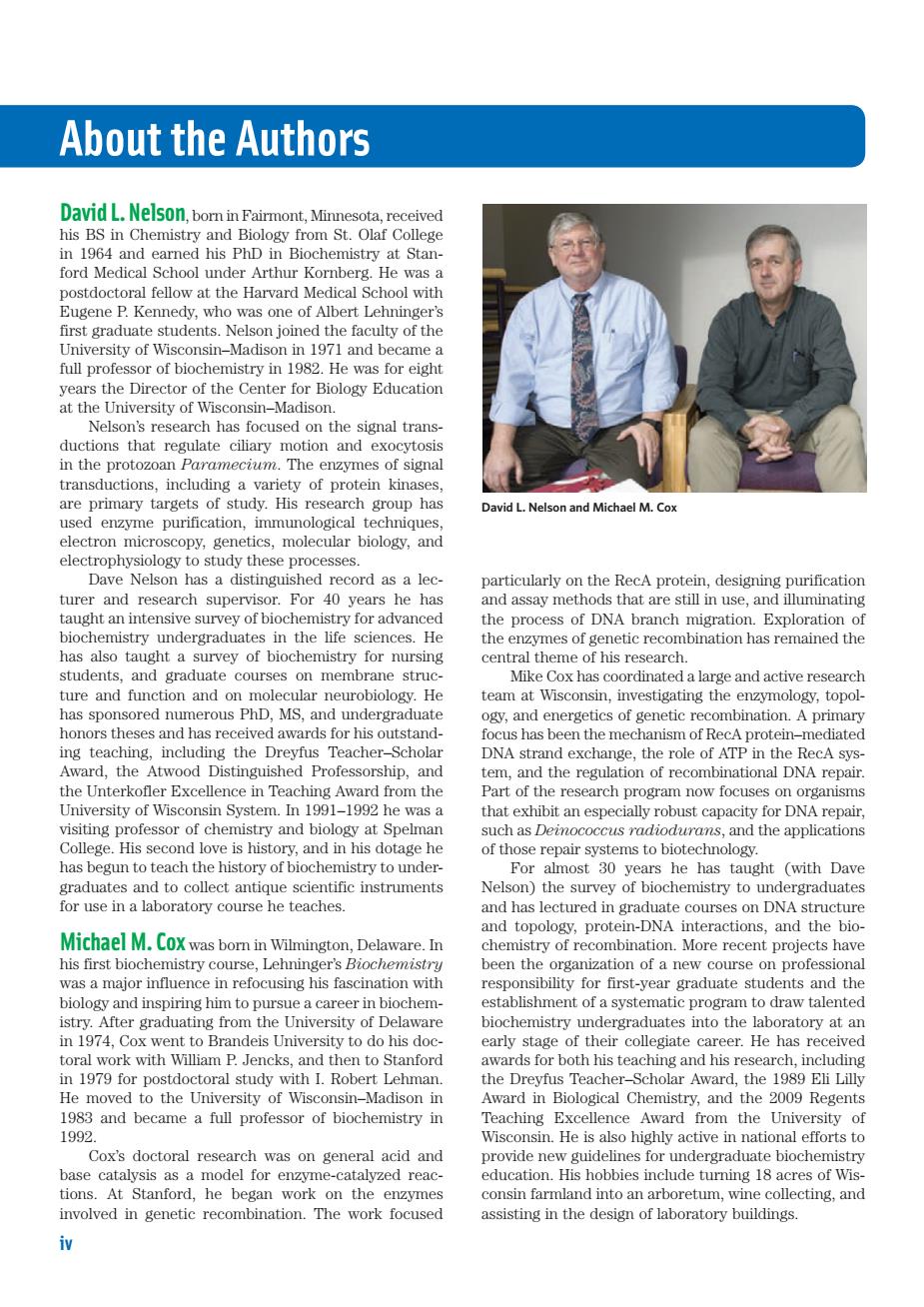正在加载图片...

About the Authors David L.Nelson.bom in fairmont.minnes of th full professor of biochemistry in 1982.He was for eight years the Director of the Center for Biology Education at th the signal tran ductions that regulate ciliary motion and exocytosis the protozoan Paramec The enzymes of signa nvid L.Nelson and Michael M.Co denyme purification,mm Dave Nelson has a distinguished record as a lec particularly on the RecA protein,designing purificatior turer and research supervisor.For 40 years he has and assay methods that are still in use,and illuminating has also taught a survey of biochemistry for nursing central theme of his research graduate cou g. top honors theses and has re for his outstand focus has been the mechanism of RecA protein mediated ing te acher-Schola DNA ange,the role ATP in he RecA sya the Unterkofler Excellence in Teaching Award from the Part of the research program now focuses on organisms University of Wisconsin System.In 199 -1992 he was a has pegun to teach the histor of biochemistr to under For almost 30 rs he has taught (with Dave Nelson)the survey of biochemistry to undergraduates and has ngate S on DNA S Michael M.CoX was born in Wilmington,Delaware.In been the biolog nd in piring hi ogram to draw talente istry.After graduating from the University of Delaware biochemistry undergraduates into the laboratory at ar ersity to do ms early st e of their collegiate He the Dreyfus Teacher-Scholar Award,the 1989 Eli Lilly He moved to the University of Wisco nsin-Madison ir Award in Biological Chemistry and the 2009 Regent 99 3 and became a full pro Cox's doctoral resea rch was on general acid and provide new guidelines for undergraduate biochemistry alyzed reac n ron.H nobbies include turning 18 nd in the David L. Nelson, born in Fairmont, Minnesota, received his BS in Chemistry and Biology from St. Olaf College in 1964 and earned his PhD in Biochemistry at Stanford Medical School under Arthur Kornberg. He was a postdoctoral fellow at the Harvard Medical School with Eugene P. Kennedy, who was one of Albert Lehninger’s first graduate students. Nelson joined the faculty of the University of Wisconsin–Madison in 1971 and became a full professor of biochemistry in 1982. He was for eight years the Director of the Center for Biology Education at the University of Wisconsin–Madison. Nelson’s research has focused on the signal transductions that regulate ciliary motion and exocytosis in the protozoan Paramecium. The enzymes of signal transductions, including a variety of protein kinases, are primary targets of study. His research group has used enzyme purification, immunological techniques, electron microscopy, genetics, molecular biology, and electrophysiology to study these processes. Dave Nelson has a distinguished record as a lecturer and research supervisor. For 40 years he has taught an intensive survey of biochemistry for advanced biochemistry undergraduates in the life sciences. He has also taught a survey of biochemistry for nursing students, and graduate courses on membrane structure and function and on molecular neurobiology. He has sponsored numerous PhD, MS, and undergraduate honors theses and has received awards for his outstanding teaching, including the Dreyfus Teacher–Scholar Award, the Atwood Distinguished Professorship, and the Unterkofler Excellence in Teaching Award from the University of Wisconsin System. In 1991–1992 he was a visiting professor of chemistry and biology at Spelman College. His second love is history, and in his dotage he has begun to teach the history of biochemistry to undergraduates and to collect antique scientific instruments for use in a laboratory course he teaches. Michael M. Cox was born in Wilmington, Delaware. In his first biochemistry course, Lehninger’s Biochemistry was a major influence in refocusing his fascination with biology and inspiring him to pursue a career in biochemistry. After graduating from the University of Delaware in 1974, Cox went to Brandeis University to do his doctoral work with William P. Jencks, and then to Stanford in 1979 for postdoctoral study with I. Robert Lehman. He moved to the University of Wisconsin–Madison in 1983 and became a full professor of biochemistry in 1992. Cox’s doctoral research was on general acid and base catalysis as a model for enzyme-catalyzed reactions. At Stanford, he began work on the enzymes involved in genetic recombination. The work focused particularly on the RecA protein, designing purification and assay methods that are still in use, and illuminating the process of DNA branch migration. Exploration of the enzymes of genetic recombination has remained the central theme of his research. Mike Cox has coordinated a large and active research team at Wisconsin, investigating the enzymology, topology, and energetics of genetic recombination. A primary focus has been the mechanism of RecA protein–mediated DNA strand exchange, the role of ATP in the RecA system, and the regulation of recombinational DNA repair. Part of the research program now focuses on organisms that exhibit an especially robust capacity for DNA repair, such as Deinococcus radiodurans, and the applications of those repair systems to biotechnology. For almost 30 years he has taught (with Dave Nelson) the survey of biochemistry to undergraduates and has lectured in graduate courses on DNA structure and topology, protein-DNA interactions, and the biochemistry of recombination. More recent projects have been the organization of a new course on professional responsibility for first-year graduate students and the establishment of a systematic program to draw talented biochemistry undergraduates into the laboratory at an early stage of their collegiate career. He has received awards for both his teaching and his research, including the Dreyfus Teacher–Scholar Award, the 1989 Eli Lilly Award in Biological Chemistry, and the 2009 Regents Teaching Excellence Award from the University of Wisconsin. He is also highly active in national efforts to provide new guidelines for undergraduate biochemistry education. His hobbies include turning 18 acres of Wisconsin farmland into an arboretum, wine collecting, and assisting in the design of laboratory buildings. About the Authors David L. Nelson and Michael M. Cox iv FMTOC.indd Page iv 10/10/12 7:30 AM user-F408 /Users/user-F408/Desktop